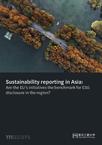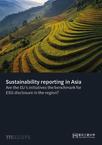By comparing ESG reporting frameworks in both the EU and a selection of representative countries in Asia, we hope to provide regulators, business leaders, investors, and other interested stakeholders with a broader understanding of the obstacles and opportunities of the various sustainability reporting approaches.
Developments shaping the ESG landscape: what’s driving the agenda?
The ‘equivalence’ or ‘convergence’ of multiple national and international ESG reporting frameworks is top of the agenda for many regulators as they look to address concerns over the global competitiveness of local companies and manage the burden of overlapping and overly complex requirements for internationally active companies. By providing an overview of the sustainability reporting landscapes in the EU and Asia, we can assess how recent developments are driving the agenda and shaping the availability of quality corporate ESG data. Find out which countries currently operate on a ‘mandatory’, ‘voluntary’ or ‘comply or explain’ basis and what changes are on the horizon.
Making more data available is a priority. Unless there is a certain level of data available, commercial institutions and institutional investors cannot assess the sector’s vulnerabilities to sustainability risks, like climate change.
Ikeda Satoshi
Understanding stakeholders: the key to directing capital towards sustainable PAAs
To direct capital towards sustainable projects, activities, or assets (PAAs), it is paramount first to understand the sustainability risks and impacts of vital economic stakeholders, most notably large corporate entities and financial institutions. The report provides contextual insights and perspectives from EU and Asia-based experts that underpin the challenges among Asian regulatory, corporate, and financial stakeholders to craft adequate responses that balance the sustainability data expectations of international investors and the often-complex domestic economic realities. Learn how their sustainability data expectations and complex domestic economic realities influence the landscape.
Mori Yoichi
A global frontrunner in ESG reporting: does the EU provide a template?
We assess the transposability potential of the EU’s sustainability reporting initiatives by exploring how the EU’s shifting approaches and recent adjustments towards double materiality and the establishment of a common taxonomy for green activities have gradually led to differing acceptance levels for its plans among Asian law- and policymakers. With the EU’s rules seen as too rigid in most Asian jurisdictions, the transposability of sustainability reporting-related rules is now a significant challenge. Find out which current reporting-related rules are most favoured and why.
I don’t think the European approach fits with global demand. It’s too granular, too detailed, too ambitious for a lot of jurisdictions. From a global perspective, the two-pillar approach of ISSB and GRI, representing respectively financial materiality and impact materiality, is more promising.
Alexander Bassen
Read our new report to discover how mapping sustainability reporting frameworks and the stringency levels of the main reporting obligations across jurisdictions can establish a comparative reporting benchmark to help identify the current levels of ambition across the covered jurisdictions.
Contacts
Dr. Kim Schumacher
Dr. Kim Schumacher is an Associate Professor in Sustainable Finance and ESG at Kyushu University in Japan. Until recently, he was a Lecturer in Sustainable Finance and ESG at the Tokyo Institute of Technology, having created and directing the first graduate-level course on Sustainable Finance in Japan. Prior to this, he was a postdoctoral researcher at the University of Oxford. He is also the Lead Science and Sustainability Advisor and Chair of the Scientific Advisory Board of Spuerkeess, Luxembourg’s largest financial institution. Dr. Schumacher is also a Member of the GRI’s Sustainability Standards Board (GSSB) and of the ISO Technical Committees on Sustainable Finance and Environmental Management. He earned his PhD in Environmental Science at the University of Tokyo after receiving a Master’s degree at the University of California (Berkeley) and an undergraduate degree at the University of Lille.








